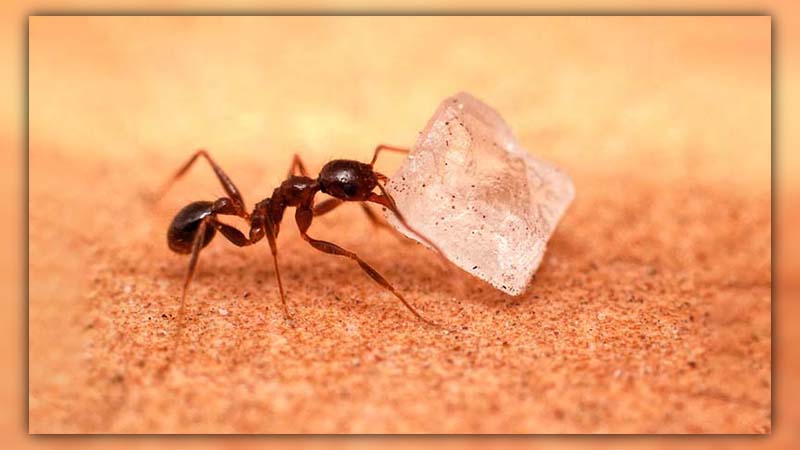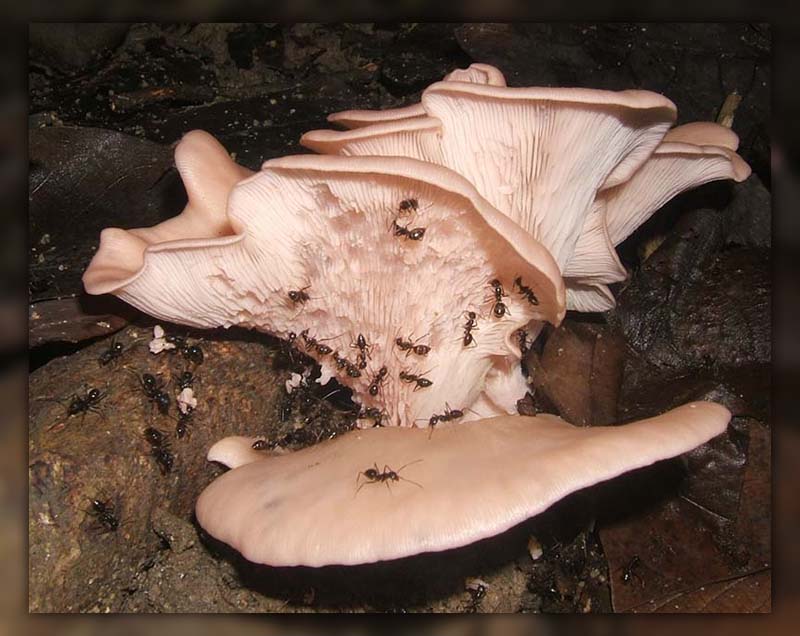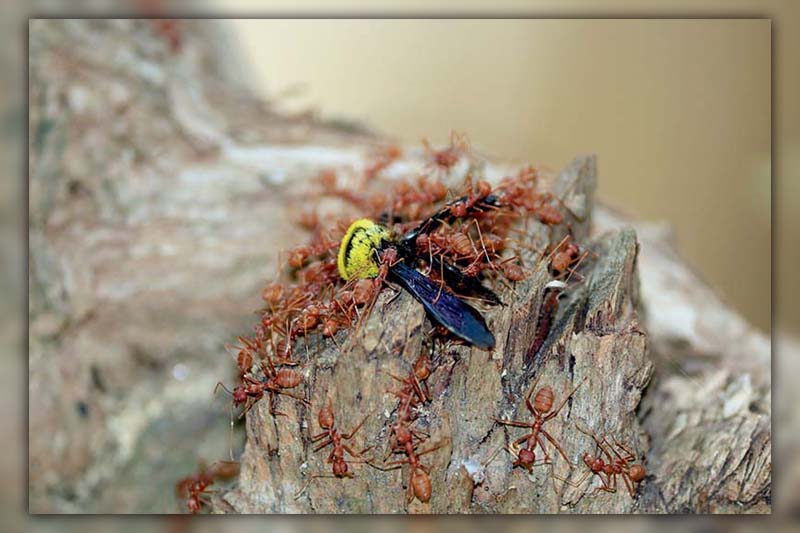Ever stumbled upon a sugar-crazed battalion of ants feasting in your pantry, leaving you bewildered and wondering, “What do ants eat?”
Or have you ever gazed in astonishment at the Herculean strength of an ant carrying food morsels back to its colony, wishing you knew more about these fascinating creatures’ dietary habits?
Well, you’re not alone!
We’ve got you covered. In this informative piece, we’ll unravel the mystifying world of ant diets, taking you on an exciting culinary journey of these industrious tiny creatures.
From their fondness for candy to their dietary interest in proteins, fats, insects, fungus, and more, we’ll explore all things ants relish.
Be ready to become the ‘ant-whisperer’ among your peers, armed with intriguing facts to prevent those unwelcome ant invasions in your home!
What Ants Eat?
Ants, those fascinating tiny workers of nature, eat a variety of foods depending on their specific species and the availability of food sources in their habitat. Now let’s dive into the mouth-watering menu of these six-legged critters.
Ants are very fond of candy and sugar
Much like humans with a sweet tooth, ants are also smitten by the allure of sugar. Any sugar-coated item left unattended will instantly turn into a grand feast for them. From candy leftovers to juice spills, ants are ever ready to throw a sugar party.
Protein and fats
Not to be typecast as sugar junkies, ants are also very keen on their protein and fat intake. They are nature’s little bodybuilders, feeding on sources like meat scraps, seeds, and oils to fulfill their dietary requirements.
Living and dead insects
Ants are not fussy eaters! They’re happy to munch on both living and deceased insects, making them vital players in nature’s clean-up crew. Don’t be surprised to see an ant nibbling on a dead fly or hunting smaller insects.
Fungus
Did you know that some ants cultivate and munch on their own fungus? Yes, indeed! These little gardeners, known as leaf-cutter ants, create their own source of nourishment. They’re the sustainable farmers of the insect world!
Water
Like all living organisms, ants also need water to survive. They’re excellent at finding moisture in their environment, be it a small puddle, dew drops on a leaf, or even a leaking pipe in your house!
It’s fascinating to delve into the dining habits of ants. Their vast and varied diet is a testament to their adaptability and resilience. But remember, if you spot a line of ants heading towards your pantry, it might be time to put those sugar jars away!
Source: Temponaut Timelapse
Learn How Ants Search For and Consume Food
Ants have a remarkable system for searching and consuming food, built on teamwork and chemical communication. They leave pheromone trails leading to food sources, like breadcrumbs for their ant colleagues to follow.
Once the food is located, they carry it back to the colony, showcasing their famous strength.
What Types of Insects Can Ants Eat?
Ants are opportunistic omnivores, consuming a variety of insects. From beetles to caterpillars, and spiders to other ants, their menu is diverse.
However, the size and type of insect prey may vary based on the ant species and its capabilities.
Do Ants Eat Human Flesh?
Rest assured, ants do not eat live human flesh. But, in the absence of other food sources, they may nibble on dead human skin cells or consume human food scraps.
Remember, they are scavengers by nature, not predators.
What Do Different Ant Species Eat?
Diet diversity is seen across different ant species. While the carpenter ant prefers sweet foods and insects, the fire ant likes fatty foods like meats and greasy seeds.
Leaf-cutter ants, on the other hand, prefer to dine on the fungus they cultivate from chewed up leaves.
A Complete List of the Top 15 Foods the Ant Eats
- Sugar and sweets
- Fruits
- Seeds
- Meats and fats
- Insects (both dead and alive)
- Fungus
- Nectar
- Honeydew (a sweet liquid produced by aphids)
- Bread and grains
- Decaying wood
- Dead animals
- Vegetables
- Plant sap
- Pet food
- Water
FAQs
Do Ants Eat Grass and Leaves?
While most ants don’t eat grass and leaves directly, leaf-cutter ants use them to cultivate their fungus farms, their primary food source.
Do Ants Eat Dead Animals?
Yes, ants do eat dead animals. As scavengers, they play a vital role in the ecosystem by helping break down and recycle organic matter.
Do Ants Eat Dead Ants?
Surprisingly, some ant species do consume their deceased comrades, often as a means of colony clean-up, while others might carry their dead away from the colony to avoid diseases.
Can Ants Eat Through Plastic?
Ants can’t eat through plastic. However, they are excellent at finding tiny gaps or holes to reach food stored in plastic containers.
Do Ants Eat Dead Bugs?
Absolutely! Ants are opportunistic feeders and will gladly consume dead bugs, making them nature’s efficient waste managers.
With this newfound understanding of “what do ants eat,” you’re well equipped to keep these fascinating critters at bay, thanks to Pestweek‘s insights.
Enjoyed reading this? Share the ant love with friends and family and help us spread the word!

Calina Mabel has over 15 years of experience in the field of journalism and communications. Currently, Calina Mabel is the Content Writer for categories such as Cockroach, Ants, Bed Bugs, Mosquito, Rodent, Termite, and Flies on Pestweek.com. She aims to build content for these categories with a focus on providing valuable and accessible information to readers, in order to create the world’s largest knowledge community about Pests.
All content written by Calina Mabel has been reviewed by Emily Carter.




